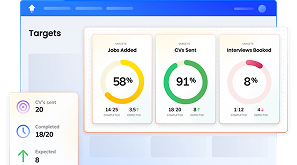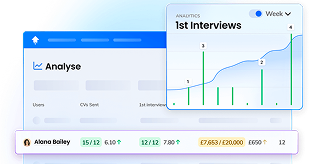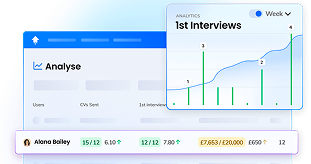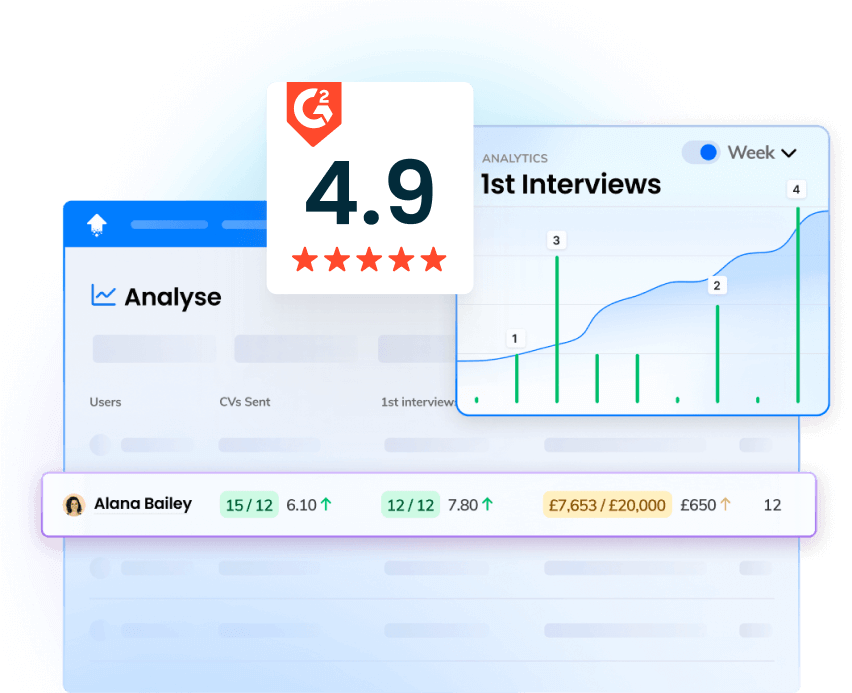Most experienced recruiters will remember that one manager they had.
The one who you really connected with — who inspired and motivated you to overcome obstacles and succeed.
Many will also remember the time they worked under a less inspiring manager.
One who didn't seem to care about their team members, who micromanaged, or whose communication left much to be desired.
No prizes for guessing which of these managers generated the best results.
Effectively managing recruitment teams is not rocket science — but it's vital that you get it right.
Why?
Effective recruitment management drives successful client and candidate outcomes, ensures streamlined and efficient recruitment processes, helps build strong client relationships, and cultivates motivated and high-performing recruiting teams.
It enhances agency reputation, optimises resource use, and maximises placement success.
And all of this boosts the bottom line.
Simply put, effective recruitment management is central to almost all your KPIs, and without it, you're unlikely to hit your organisational goals.
So, what does it take to become an outstanding recruitment manager?
In this article, we'll discuss the key traits of an effective recruitment manager and share 22 actionable tips to help you improve your management skills.
Key Traits of an Effective Recruitment Manager
What essential qualities and skills do you need to effectively manage and develop a team of recruiters?
An effective recruitment manager is a:
- Strong leader
- Recruitment industry expert
- Strategic thinker
- Excellent communicator
- Natural problem solver
- Great organiser
- Intuitive talent spotter
- Talented relationship builder
- Good listener
They're also:
- Motivational
- Empathetic
- Supportive
- Patient
- Adaptable
- Confident
- Detail-oriented
22 Tips On How To Manage a Recruitment Team
Wondering how to manage a team of recruiters more effectively?
So, ready to discover how to manage recruiters?
Here are 22 actionable recruitment tips to help you level up your management technique and drive your team to success.
#1 Set Clear and Achievable Goals
Setting SMART goals is a key part of building the infrastructure of a high-performing team.
The importance of setting clear and achievable goals for the success of a recruitment team cannot be overstated.
They provide direction, focus, and motivation for your team, ensure recruiters take the actions you want and need them to take, and align your team with broader organisational objectives.
Goals also improve efficiency and productivity and foster accountability within the team.
SMART goals are:
- Specific
- Measurable
- Achievable
- Relevant
- Time-bound
Here's an example of a goal that does not meet SMART criteria:
- Spend less time placing each candidate.
Here's that same goal now transformed into a SMART goal:
- Reduce your average time-to-hire (from job added to placement made) to [X days] by [Y date].
The second version sets clear parameters around what the recruiter must do and when.
Vitally, it is also highly trackable.
In order to motivate the recruiter to hit their goal, and ensure both they and you can easily track their progress, it's essential to set up a custom dashboard for their average time to hire.

Setting up a custom dashboard to track progress towards SMART goals also empowers you to properly acknowledge and celebrate your recruiter's win when they finally hit them.
#2 Foster a Collaborative Team Culture
Recruiters can be competitive with their colleagues.
And this isn't a bad thing — competition is hugely motivational for recruiters.
But there's a time and a place for competition.
In 2024, we've learned that collaboration and trust among recruiters can hugely support business goals.
Fostering a collaborative team culture means enhanced communication, shared insights, and efficiency gains.
When recruiters work together, they can leverage each other's strengths to resolve issues more effectively and innovate more.
They can also improve their weaker skills by learning from each other.
Ultimately, they're working together towards achieving agency goals.
Collaborative teams also tend to have better morale, which means your top recruiters are more likely to stick around for longer.
Foster collaboration in your recruitment team by:
- Encouraging open communication
- Promoting teamwork with shared goals and incentives
- Celebrate successes together
- Implement a solid training and development programme
- Facilitate knowledge sharing
- Lead by example
#3 Use Gamification to Motivate Recruiters
Gamification increases engagement and productivity.
It helps to foster collaboration and healthy competition.
It improves learning.
And it's fun, boosting morale.
In fact, gamification is one of the best tools in your arsenal when it comes to motivating recruiters.
Gamification essentially means incorporating game-like elements into your working day.
Popular elements include competitions, leaderboards and incentives.
With OneUp, for example, you can create leagues, challenges, missions, and more.
Set up leaderboards with real-time data so recruiters can see their performance against their teammates and display them on screens around the office.
Create team-wide or individual incentives to motivate your reps.

You can also automate celebration anthems or personalised broadcasts that play when a team member hits a milestone or a goal.
#4 Set Up Healthy Competitions
Foster healthy competition by creating competitions between individuals or teams, incentivising them to work together to rise up the leaderboard and smash their targets.
Competitions can help you overcome many hurdles, from strengthening your team's weakest skills to motivating them to do more of the activities you want them to do.

Display the leaderboard on screens around the office so the challenge is always front of mind, and automate celebration anthems for when an individual or team hits their goal.
Then, sit back and watch performance improve.

#5 Schedule Regular 1:1s
Regular 1:1s offer a dedicated space for personalised feedback, career development discussions, and addressing queries or concerns.
They allow you to clarify your expectations with team members and align individual goals with team objectives.
In 1:1s, employees can open up to their manager, voicing ideas and receiving helpful guidance.
Ultimately, they are a vital tool in building strong manager-recruiter relationships, and boosting overall performance and team morale.
However, recruitment managers are busy people — and 1:1s often slip to the bottom of the to-do list.
Set up regular, recurring 1:1s in your calendar, whether weekly, bi-weekly, or monthly, and then stick to them.
If annual leave or sickness gets in the way of a 1:1, reschedule it.
Your commitment to taking time out of your day for each team member will help your recruiters feel valued and build their respect for you.
#6 Allow Time for Recruiters to Focus on Hiring
This one sounds obvious, but often it is not adhered to.
Recruiters need dedicated time to focus on their primary tasks without distractions.
If you fill their calendars with endless meetings and training sessions, they may feel like they have no time to work towards their recruitment goals.
This can lead to anger and frustration, especially if they are forced to work late to compensate.
If you have an especially busy agency, consider blocking out dedicated recruitment time in the team calendar so that everyone is left undisturbed to focus on their primary tasks.
#7 Encourage Creativity in Recruitment
In a highly competitive job market, recruiters need to be able to stand out from the crowd.
And a simple way to do this is to get creative.
Drive creativity on your team by promoting innovative approaches to recruitment — such as sourcing from unusual channels — and allowing creativity in job postings and candidate outreach.
#8 Communicate Effectively
As a recruitment manager, the majority of your job is communication.
This means you must be a skilled and effective communicator who understands the importance of open, honest, and frequent communication.
Communicate effectively, and you will be rewarded with team alignment on goals, expectations, and tasks, high team morale, and improved engagement and motivation.
Effective communication is also vital when providing constructive feedback, addressing concerns, and offering support.
Ultimately, it's key to enhancing your team's performance and fostering a productive and harmonious working environment.
Conversely, managers who are bad at communicating tend to lead confused, unhappy, and disengaged teams.
These teams are often unsure of exactly what they're meant to be doing and whether their manager cares.
#9 Provide Ongoing Training and Development
Strong recruitment managers understand the importance of training and upskilling their team, both to improve recruiters' current performance and help them achieve their overall career goals.
What's more, with techniques and technology in the recruitment industry developing rapidly, you must ensure recruiters' skills are up-to-date and relevant in order to remain competitive.
Many components can make up a training and development programme, including:
- Internal group training
- External group training
- Internal one-on-one training
- External qualifications
- Peer-to-peer coaching
- Mentoring
- Desktop learning
- Conferences
- Lectures
- Webinars
#10 Lead by Example
'Do as I say, not as I do' has never worked.
Recruitment managers must demonstrate the behaviour and standards that they expect from the team.
This will not only help foster the desired culture on the team, encouraging recruiters to follow in your footsteps, but it will also engender respect and trust for you.
#11 Use Data-Driven Decision Making
In 2024, operating on gut instinct alone is no longer an option.
Well, not if you want to remain competitive.
Data-driven decision making is essential when it comes to how to manage a recruiting team.
Leveraging analytics for performance tracking gives you cold, hard data on each team member's performance.
You can see who needs to improve in what area, whose strong skills should be leveraged for which projects, and which projects are on track — or not.
This knowledge allows you to implement interventions where needed and prevent minor problems from becoming huge.
It's important to democratise this data, too.
If your team has access to data insights surrounding their performance, they should take accountability and ownership and strive to improve.
With OneUp, recruitment managers can create custom dashboards to track progress towards individual and team goals.
With a clean and straightforward interface and intuitive data visualisations, every recruiter should be able to get an overview of their performance at a glance.
The dashboards work on real-time data pulled from across your existing tech stack, and reports can be automated, meaning you only have to build them once.
#12 Empower Your Recruiters
Micromanagement stifles your team.
Instead, recruiters should be empowered to grow and achieve.
Delegation is a valuable technique when it comes to empowering your team.
Not only will it foster autonomy, inspiring recruiters to take ownership of their projects and performance, but it will also enhance productivity and optimise your resources.
Assign tasks to recruiters based on their individual skills, strengths, and interests, demonstrating your confidence in them.
You can then focus on your strategic priorities while developing your team's skills and confidence.
The result?
Improved recruitment performance and team morale.
#13 Provide Constructive Feedback
Schedule regular performance reviews and feedback sessions — and put data at the heart of these conversations.
During these meetings, deliver clear, actionable, data-backed insights for improvement, with custom dashboards to support them.
Focus on identifying strengths and areas for growth, guiding skills development, and improving overall performance.
Finally, ensure the recruiter leaves the meeting with clear SMART goals to work towards — and feeling positive and motivated.
#14 Recognise and Reward Success
As a recruitment manager, celebrating wins and achievements is one of the best parts of your job.
In recruitment, we typically reward success with incentives such as monetary bonuses, social events, or even group trips.
These incentives are invaluable when it comes to rewarding your team.
However, don't underestimate the importance of a pat on the back too.
Your recruiters will likely need private and public recognition of their achievements — and a hearty "well done" from their manager — more than you realise.
So recognise their achievement in your 1:1s, as well as in team meetings and your meetings with higher-ups.
Support this with OneUp's gamification features, which include automated celebration anthems and personalised messages that can be queued up to play across the screens in your office when someone hits a goal.

#15 Create a Consistent Recruitment Process
Which of the two scenarios below sounds better?
- Your recruiters all use their own ad hoc recruitment process. There are some similarities with their colleagues' recruitment process, and some standardised elements — but generally they just do whatever they need to do to get the job done quickly.
- Through years of shared experience in recruitment and key data insights, you and your team develop and then hone your optimal recruitment process. You standardise this process to ensure all clients receive the same service and new recruits can quickly get up to speed.
In the first scenario, there's little thought going into the recruitment process; your recruiters are wasting heaps of time, and clients and candidates will have disparate journeys with your agency.
This strategy is unlikely to reap the results you want.
And it definitely won't deliver consistency.
In scenario number two, you develop the best possible recruitment process to help you hit your goals.
It is optimised for efficiency, productivity, and results.
Your strategy is designed to streamline hiring workflows, eliminate biases, maintain high-quality client and candidate experiences, and be easy to track.
Next, you standardise it, ensuring your recruiters have all the support and materials needed to conduct this strategy repeatedly.
Finally, continue to hone your strategy as more data insights are revealed, and deliver continuous training to ensure it is being followed closely by every team member.
#16 Leverage Recruitment Technology and Tools
In 2024, recruiters are fortunate to have access to a wide range of advanced technology and tools that help them boost their results.
In order to keep up with — or get ahead of — the competition, every modern recruitment agency must develop a sophisticated tech stack.
This tech stack may include:
- Recruitment CRMs: These platforms manage candidate and client interactions and data, automate communication, enable quick job sourcing and posting, track candidates through the pipeline, facilitate collaboration, and allow users to develop custom workflows.
- Applicant Tracking System: An ATS tracks applicants throughout the hiring process and can be used to streamline and automate activities within in
- Recruitment Management System: An RMS typically manages the entire recruitment process, combining the capabilities of a recruitment CRM and ATS.
- Recruiting analytics software: While many software in the tech stack will likely have their own data analytics centre, it's important to have a single source of truth for your data and a tool that gives you all the answers you need. OneUp pulls real-time data from the rest of your tech stack onto its user-friendly data analytics platform.
#17 Focus on Candidate Experience
Leading by example is a big one here.
In recruitment agencies, the focus is often — understandably — on delighting clients.
As a result, the candidate experience can often fall by the wayside.
But in order to delight your clients, it's essential to adopt a candidate-centric recruitment approach.
After all, if your clients receive negative feedback on the candidate experience from their hire, they'll think twice about using you again.
And if candidates have a bad experience with you, they may warn their friends and colleagues to avoid your agency, write bad reviews online, or even post on social media.
This can destroy an agency's reputation and significantly narrow its talent pool, making it much harder to delight clients.
#18 Manage Time Effectively
When it comes to how to lead a recruitment team, time management is a crucial skill.
But with so many competing priorities, mastering time management is not always as easy as it sounds.
So remember:
- Set clear goals for your day and week
- Plan your day with blocks for different activities
- Prioritise urgent and high-value tasks
- Delegate effectively
- Limit interruptions by setting boundaries with your team
- Use task management tools like Trello or Asana
- Automate routine tasks
#19 Adapt to Market Changes
The recruitment landscape is constantly shifting, whether due to changing economic conditions, labour market trends, industry growth, working trends, or regulatory changes.
As a recruitment manager, you need to ensure that your team and working practices are agile enough to respond successfully to these changes.
Regularly analyse industry and internal trends to identify the next big change, and then strategise in terms of your response.
Once your strategy is clear, communicate it to your team, and provide them with the training and the tools they will need to enact it.
#20 Build a Supportive Work Environment
A supportive work environment is vital if your team is to thrive.
And it's up to you to deliver this.
Here's how:
- Encourage open communication
- Provide regular feedback
- Promote work-life balance
- Offer professional development
- Recognise and reward contributions
- Encourage team collaboration
- Provide supportive leadership
- Ensure a safe and inclusive workplace
- Address conflicts promptly
#21 Monitor and Adjust Recruitment Strategies
Your recruitment strategy may work brilliantly right now.
But will it still be as effective in six months? A year?
Recruiting managers must view their strategies as living, breathing documents that must be consistently reviewed and adjusted.
If your data tells you that one sourcing channel isn't reaping results for your clients, for example, you may want to eliminate that channel from your strategy.
Or, if the quality of your candidates is steadily decreasing, you may want to review your screening approach.
Perhaps you notice a sudden demand for fintech skills and need to adjust your sourcing techniques accordingly.
To effectively hone your recruitment strategies, you need accurate, real-time data you can understand at a glance.
OneUp empowers you to track and understand all your data in one place.

This intuitive platform empowers you to visualise and report on data from your CRM, VoiP, Engagement, and Timesheets software in real time.
Build custom reports with beautiful visualisations and share them with your team to spot performance trends over time.
Save as many reports as you like, so the data is only ever one click away.
Drill down into analytics to see what contributed to your target metrics over any period of time.
Automate these reports to land in your inbox whenever you're likely to need them.
#22 Maintain Work-Life Balance
Work-life balance has become increasingly important to employees in the wake of the pandemic.
And there are numerous benefits to ensuring a good work-life balance on your team.
It ensures your team is not overworked, feels valued, stays motivated, and avoids burnout.
Here are some techniques you can adopt to promote a good work-life balance in your recruiting team:
- Promote flexible working hours
- Allow remote and hybrid working
- Encourage annual leave
- Discourage presenteeism
- Set clear communication boundaries
- Lead by example
- Provide resources such as wellness programmes and counselling services
- Recognise and reward balance
- Foster a supportive culture
- Monitor workloads
Key Takeaways for Leading a High-Performance Recruitment Team
While managing a recruitment team can be challenging, it's not rocket science.
Strong leadership, effective communication, and strategic thinking are all essential for recruiting success.
Remember to celebrate successes, learn from challenges, and maintain an open-door policy to build trust and motivation.
By fostering a collaborative environment, providing ongoing training, and staying updated on industry trends, you can ensure your team is always at the top of their game.
Ready to elevate your recruitment game? Discover how OneUp can help you to cultivate a world-class recruitment team. Book your demo today.



















